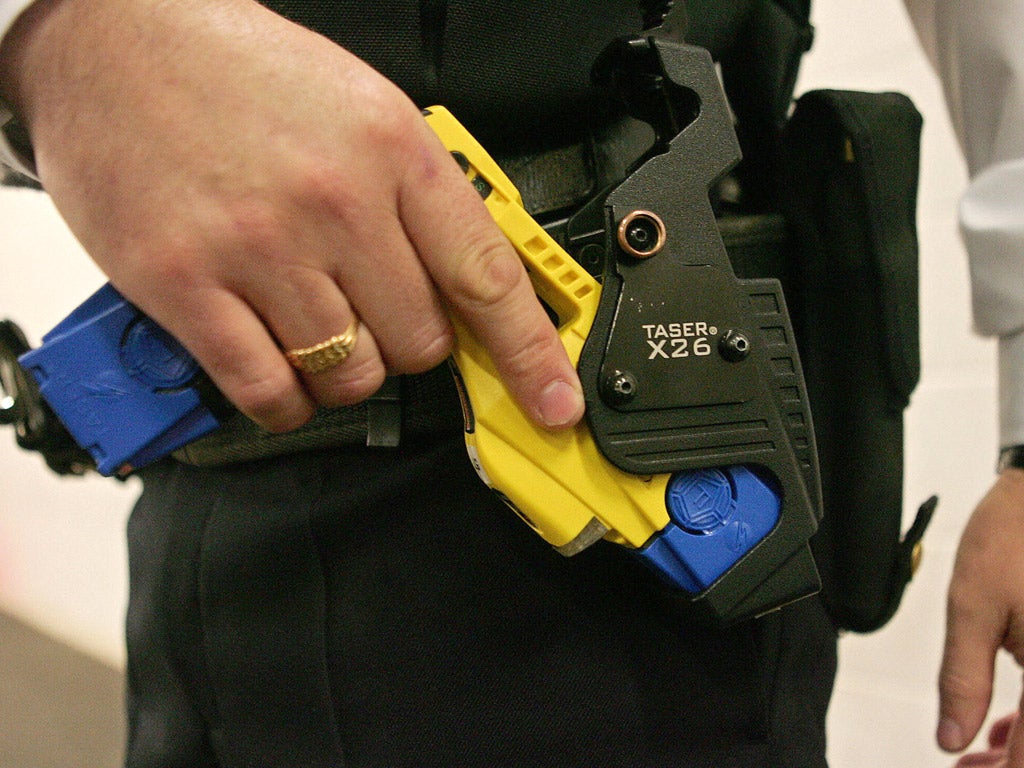A less lethal weapon? As Taser use is rolled out across London, the public has much to fear
If we look abroad, the link between taser use and fatal injury has already been found

Your support helps us to tell the story
From reproductive rights to climate change to Big Tech, The Independent is on the ground when the story is developing. Whether it's investigating the financials of Elon Musk's pro-Trump PAC or producing our latest documentary, 'The A Word', which shines a light on the American women fighting for reproductive rights, we know how important it is to parse out the facts from the messaging.
At such a critical moment in US history, we need reporters on the ground. Your donation allows us to keep sending journalists to speak to both sides of the story.
The Independent is trusted by Americans across the entire political spectrum. And unlike many other quality news outlets, we choose not to lock Americans out of our reporting and analysis with paywalls. We believe quality journalism should be available to everyone, paid for by those who can afford it.
Your support makes all the difference.Should the police have more Tasers in London? It’s an important question to ask, especially of those who may be subjected to their use. The arguments for more Tasers would be that Tasers are a less lethal option compared to a firearm. The arguments against their increased availability is that they would be seen to arm the police by stealth and have the potential to cause seriously injury.
So why were Londoners not consulted before the Commissioner embarked on his ‘Taser Roll-Out Programme’? That was one of the questions put to both the Commissioner and the Deputy Mayor of London as they gave evidence to the Police and Crime Committee’s Taser Working Group in June. Today, the Committee publishes their fundings, ‘Arming the Met, the deployment of less lethal weapons in London’. The report criticises not only the ambiguity over the decision-making process but the lack of data transparency and information given to the public.
But will these criticisms be enough to halt ‘Total Tasering’? It’s no secret that the Commissioner will continue with his ‘Total Policing’ agenda, especially as there does not seem to be any resistance from the Mayor’s Office for Policing and Crime, the policing body elected to hold the Commissioner to account. If the Mayor continues to sell the pass ‘Total Tasering’ will become a reality and will lead to policing the Capital by force.
The consequence of that will be that more people will be Tasered. There is already a growing number of individuals who have suffered injuries as a result of the Taser not just in London, but across the country. Last October, Colin Farmer, a blind man from Chorley was Tasered in the back as he made his way down a side street. And James McCarthy, a man from Liverpool, was Tasered in September 2012 and subsequently suffered a cardiac arrest, has last month issued a claim for damages for breach of his human rights under Article 2 and 3 of the European Convention of Human Rights. These are just a few examples of the innocent people being caught in the cross fire of this gun.
To date there has been no direct link to a Taser-related death in Britain. However, in 2006, Brian Loan, a 47-year-old man from Sacriston, County Durham died three days after being Tasered in the back. The Coroner’s verdict at the time did not find a connection but, the Coroner did add that “It may be in five or ten years time somebody may find a link”.
If we look to America, Canada and Australia, the link has already been found. The militarisation of their police forces is likely to be one of the contributory factors which has led to the ready use of Tasers. It could also be due to the misconception that the Taser is non-lethal. The Commissioner also seems to hold a similar misconception about Tasers, as he considers them to be a ‘tool’ rather than a ‘weapon’. The Taser is a firearm: its use is controlled under section 5 of Firearms Act 1968 and should only be used when there is a life threatening incident. If the Taser is used outside such circumstances then its use could be deemed excessive and disproportionate – and challengeable by law.
If the Commissioner is thinking of extending Taser availability for his officers in the future then I would encourage him to consult the public he has been appointed to police before taking any further step.
Join our commenting forum
Join thought-provoking conversations, follow other Independent readers and see their replies
Comments